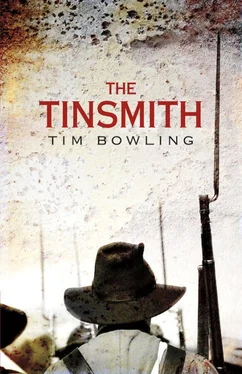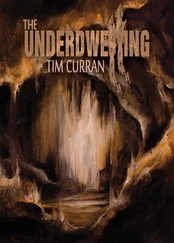But the overseer’s voice was tired, his face pale. His hands shook a little. Still he found the strength for goading.
The words, however, did not touch John. He thought better of refusing the food. The bacon smelled wonderful, and he knew the future he dreamed of was not possible if he did not recover. But his hands were still cuffed. With difficulty, he took a fork in one hand and stabbed at a strip of bacon and raised it to his mouth. But he was weak and the bacon dropped to the plate before he could put it in his mouth.
Orlett said, “Don’t just stand there, woman, feed the nigger.”
Charlotte did as she was told and, not meeting her eyes, John began to chew.
The overseer watched him closely. But John was more concerned with his nakedness, and he pulled up to the table as near as possible so that Charlotte would not see his lower body. He ate the bacon with increasing appetite and gratefully drank the water that Charlotte held to his mouth. His cheek throbbed with pain, especially when he chewed. The muscles in his face seemed torn. Charlotte gaped at him; sometimes she even missed his mouth with the forkful of bacon.
Finally the overseer told her to stop and to go and get a handglass.
“You might as well have a good look at yourself,” he said. “You won’t get the full benefit just staring into a flooded rice field.” He grinned and wiped his mouth with the back of his sleeve.
Charlotte returned.
“Hold it up to him,” Orlett said.
At first John was not going to look; he was going to stare right past the glass. But curiosity got the better of him. As well, he did not want to give any satisfaction. He vowed to look and not react.
“I know you know your letters, boy. That’s what comes of being an idle nigger.”
The truth was, he recognized some letters and could read a little, but he was not proficient. The master had not wanted any of the blacks taught. But there were enough books around, and the opportunity to look at them, that he had begun to figure out the symbols. One time Jabeth had taught him some of the sounds. But then Jabeth had become frightened for him. “When you free,” he said, “den de readin do you some good. Only trouble for you till den.”
John looked at his face in the glass. It was light brown. Two letters were branded into his right cheek: one was shaped like a snake, the other like two sticks growing out of the ground at opposite angles.
He studied them, confused.
The overseer chuckled. “Me and Cray didn’t have time or room for the whole word, but the meaning’s clear enough. You do know your letters, don’t you?”
He knew that the snake shape made a snake sound. From that, he reasoned out the word. It wasn’t nigger, so it had to be the other. But it didn’t matter what they’d burned into his skin; he’d get rid of it just as he’d get rid of the tanning. In time. In time he’d get rid of the overseer too. Daney was right about the future. There would be deliverance. But she was wrong to trust to anything but herself to make it happen.
“Well, what do you think, nigger? A new face for a new life. Ain’t you going to thank me?”
John had long since stopped wanting to tell the truth about Caleb and the hog. It wouldn’t matter anyway. The overseer’s hatred went far beyond any simple cause. Some whites were just like that. Evil. There was no sense trying to understand it. What he did understand without trying was that the evil had to be destroyed. And he couldn’t do it now. He looked at the overseer and kept all expression from his face.
Orlett belched and pushed back his chair. “Put him in the shed, Cray. The trader’ll be here soon. Then we’ll be done with him for good.”
The mulatto gripped John hard on the shoulder.
He rose and, without resistance, picked up his leg chain and walked to the door, dragging the iron ball.
An hour later, all the sold blacks were brought into the barnyard. The sun glinted off the barrel of the overseer’s gun and off the harness buckle of the trader’s horse. The horse neighed and snorted a great breath. The trader dismounted as if his joints pained him. He squinted into the bright sunlight. Almost reluctantly, he studied the blacks, most of whom were crying silently. Orlett had ordered the mulatto to keep the other blacks locked up to avoid any prolonged scenes of farewell. And that extra bit of cruelty seemed almost worse than Caleb’s punishment. From somewhere a low wailing of misery, like a dog’s howl, drifted on the air.
“The blacksmith will be along directly,” the trader said and paused before Daney. He scratched his head, then took a small pad from his pocket and studied it.
Orlett stepped forward. “I don’t know how she managed it, but she got to the old man somehow. Like I told you, he’s soft on niggers.”
McElvane scowled. “No, that’s not it. I knew she was coming. He told me about her wanting to go and said that I wasn’t obliged.”
Orlett raised an eyebrow.
The trader said, “I figure that having her along’ll make the trip easier. It won’t cost much to feed one more. But I don’t think I marked her down here. Must have forgot.”
The overseer cleared his throat and spat. “I don’t see any likely market for a old woman past breeding, but it’s your business.”
“It is that rightly.” The trader moved along the line and came to a stop in front of John. “What’s this?” he said with a wince.
Orlett laughed. “He won’t be taken so easy for white now.”
McElvane sighed and scratched his earlobe. “I told you I don’t favour violence. A nigger’s either good or bad. If he’s bad, the violence makes him worse. If he’s good, the violence can turn him bad.”
“Well,” the overseer said bluntly, “you’ve already got your receipt.”
“It’s like I told your boss, you can’t judge no dependence at all in a man.” The trader hung his head a few seconds and then gathered himself and faced the overseer. “If he weren’t a prime number one, I’d leave him and you’d be explaining to your boss why I was asking my money back.”
“I’ve done you a favour,” Orlett said. “Now if he runs, you’ll be sure to catch him.”
“Mebbe so.” The trader screwed up his face.
“Well, your buyer will be awful glad of those letters.”
“Mebbe.” The trader looked toward the road. A horse and rider approached from the village. “Here’s the blacksmith now.” McElvane turned and addressed the blacks.
“I’ve paid tall prices for you and I’ll try to see that you go to good owners. But I don’t want no trouble on the way. What’s going to be done is going to be done and if you’re good niggers everything will be fine.” He walked to his cart and removed a mass of chains and shackles. Orlett kept his gun trained on the blacks until the rider dismounted with his tools and began joining the blacks into a coffle.
Daney and her girls and four other women were merely tied together with a rope about the size of a bed cord, which was placed like a halter around the neck of each.
“I’d cuff the mother at least,” the overseer said, “if you don’t want trouble.”
“I’s goin’ with my chillen,” Daney said, some of the old power returned to her face and voice. “Why’d I run off now?”
The trader paid no attention to Orlett. He just watched as the blacksmith methodically fitted each of the male blacks, including the three boys, David, Garney, and Anesto, with an iron collar padlocked around the neck. A chain of iron, about fifty feet long, was passed through the hasp of each padlock, except at the two ends where the hasps of the padlocks passed through a link of the chain. In addition, the blacks were handcuffed in pairs, with a short chain about a foot long uniting the cuffs and their wearers, alternately, by the right and left hand.
Читать дальше












